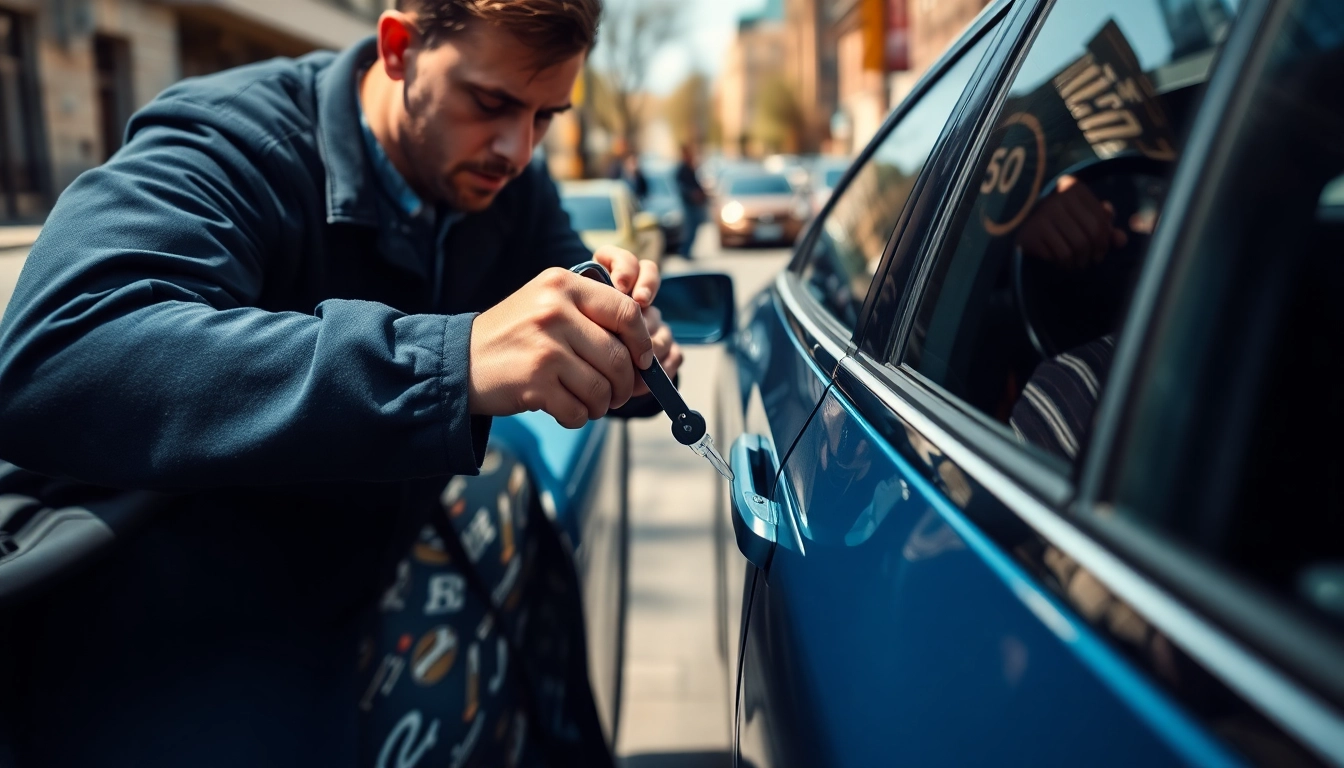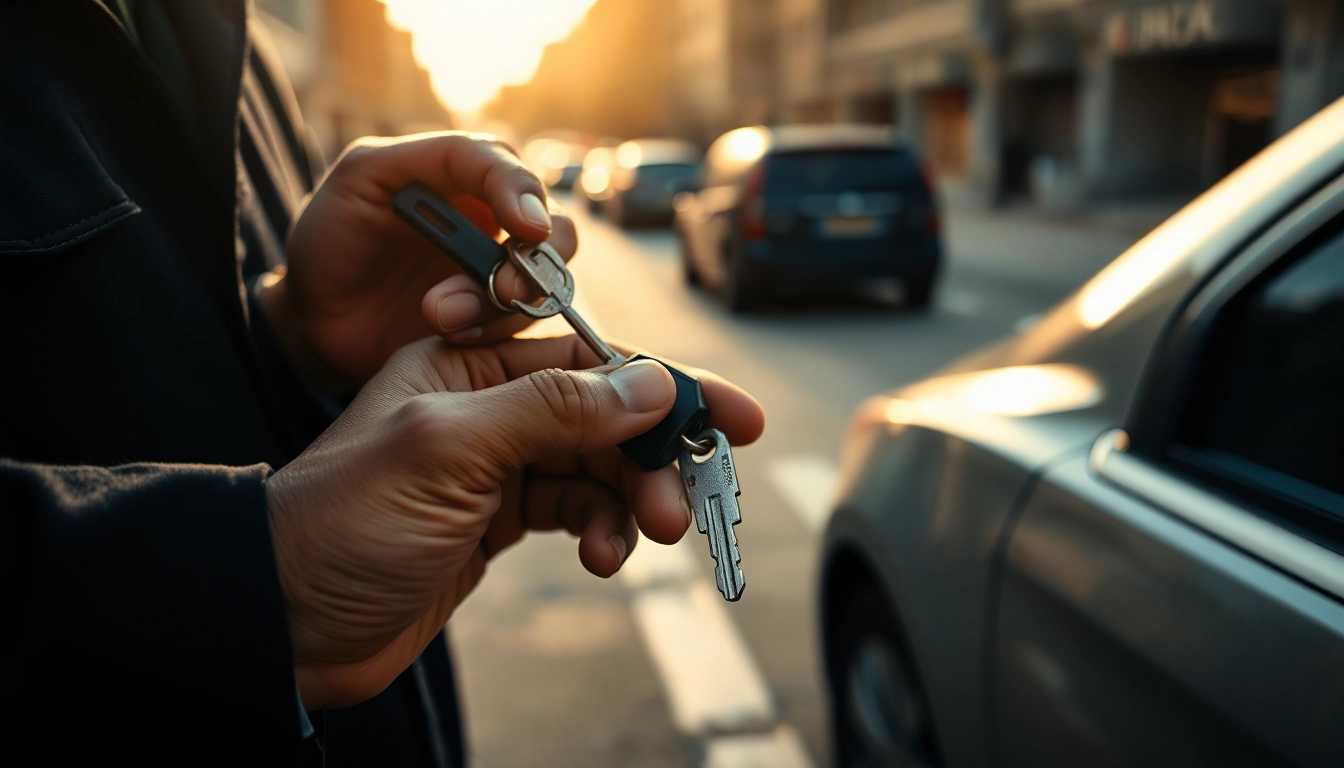Understanding the Situation: Keys Locked in Car
Finding yourself in the frustrating predicament of having your Keys Locked in Car is an experience many drivers can relate to. Whether it’s due to a moment of distraction or a miscalculated fumble with your key fob, the subsequent confusion can range from mild annoyance to sheer panic. Understanding the immediate steps to take and assessing your options can help alleviate the stress and guide you toward a solution quickly.
Immediate Steps to Take
The first thing to do upon realizing your keys are locked inside your vehicle is to pause and assess the situation. Take a deep breath and follow these steps:
- Check Your Surroundings: Ensure that it is safe to remain near your vehicle. Look for any potential hazards, especially if you’re parked on a busy road.
- Assess Your Timing: Think about when you last accessed your vehicle. It’s possible you may have left your keys in a different place or another location nearby.
- Gather Any Available Resources: If you have access to a spare key, consider whether it’s nearby or if you could quickly get it from someone you trust.
Panic Management and Safety Tips
Keeping calm during this frustrating event is crucial. Panic can cloud your judgment, leading to rash decisions that may cause damage to your vehicle. Here are some tips for managing panic:
- Remain Calm: Take several deep breaths to clear your mind.
- Consider Your Options: Think through how you can safely resolve the situation without causing damage to your vehicle.
- Ask for Help: If there are other people around, don’t hesitate to ask someone for assistance, whether it’s help finding a locksmith, accessing roadside assistance, or using tools to unlock the door.
Common Scenarios Encountered
The circumstances surrounding keys being locked in a car can widely vary. Here are some common scenarios:
- Shopping Trips: After placing shopping bags in the trunk and closing the door, a driver realizes they have locked the keys inside.
- Family Outings: When loading children and luggage into the vehicle, a busy parent accidentally shuts the door without noticing the keys were left inside.
- Fuel Stops: While stopping at a gas station, it’s easy to lock the keys in the car while refueling or running inside.
How to Access Your Vehicle: Manual Techniques
If you find yourself in a position where accessing your vehicle is urgent, there are several manual techniques that you can try before seeking professional help.
Using Common Tools to Unlock Doors
Several household items can come in handy when attempting to unlock your vehicle doors manually. Here are some common tools:
- Slim Jim: This long, flat piece of metal can slip between the weather stripping and the window to manipulate the lock mechanism.
- Wire Hanger: A sturdy wire hanger can be bent and fashioned into a hook to snag the lock mechanism or pull the door handle.
- Inflatable Wedge: This tool creates a gap between the door and the frame, allowing access for other tools to unlock the door.
Keys Locked in Car: DIY Methods
If you’re determined to try unlocking the car yourself, consider the methods outlined below. However, proceed with caution; these techniques may not work on all vehicles:
- The Wedge and Rod Method: Insert a thin wedge to create a pocket of space between the door and the frame. Then, use a thin rod or a long stick to reach in and unlock the door.
- Fishing Line Method: For cars with a vertical pull lock, a fishing line can be threaded through the door to unlock it.
When Not to Attempt Unlocking Yourself
While it can be tempting to try and free your keys on your own, some situations are better left to professionals:
- If your vehicle’s locking mechanism is sensitive or complex, DIY methods may cause more harm than good.
- Attempting to unlock a modern vehicle with electronic locks may void warranties or cause damage.
- In cases where safety is a concern, such as getting your keys locked in while parked in a poorly lit or unsafe area.
Professional Assistance: Knowing When to Call
In many cases, calling a professional is the best solution when you’re locked out of your vehicle. Understanding your options for assistance can streamline the process.
Choosing the Right Locksmith
When selecting a locksmith, consider the following:
- Check Credentials: Ensure your locksmith has the appropriate licenses and insurance.
- Request Estimates: Ask for a ballpark estimate of the cost beforehand to avoid surprises.
- Customer Reviews: Look for reviews and testimonials to gauge reliability and quality of service.
Roadside Assistance Options
Many vehicle insurance policies include roadside assistance. If you’re a policyholder, here’s what you need to know:
- Policy details can vary widely, so check your coverage limit and what services are included.
- Some policies cover locksmith services, while others may only offer towing services.
- Make sure you have relevant policy information available when you call for assistance.
Costs Involved in Expert Help
The cost of professional help can vary based on several factors:
- Location: Prices can fluctuate significantly depending on where you live and the company you choose.
- Time: If your car is locked late at night or on a holiday, expect to pay more for after-hours service.
- Service Type: Different services demand different fees, such as unlocking versus creating a new key.
Prevention is Key: Avoiding Future Lockouts
Preventive measures are essential in avoiding the frustration of being locked out of your vehicle. Here are some effective strategies:
Creating Spare Keys
Having a spare key can save you time and hassle. Consider the following options:
- Key Duplication Services: Most hardware stores or locksmiths offer key duplication services for a small fee.
- Smart Key Solutions: If your vehicle uses a smart key system, consider obtaining a replacement from your dealership, as they often have specific programming requirements.
Utilizing Keyless Entry Systems
Modern vehicles increasingly utilize keyless entry systems that greatly reduce the chances of lockouts. Here’s why you might want to upgrade:
- Convenience: Key fobs allow you to unlock your car simply by being in proximity to it.
- Enhanced Security: Many systems feature advanced encryption technologies that make unauthorized access more difficult.
Tips for Safe Key Management
Adopting good key management practices can minimize the likelihood of lockouts:
- Designated Key Holder: Designate a specific place at home or in your bag for keys, making them easy to find.
- Regular Checks: Before leaving your vehicle, develop the habit of checking for your keys to ensure they’re in hand or accessible.
Real-Life Experiences: Stories of Locked Keys in Car
Understanding stories of others’ experiences can lead to valuable learning opportunities when it comes to dealing with a lockout situation.
Lessons Learned from Common Cases
Individuals often recount learning moments from their mishaps with locked keys. Here are some typical lessons:
- Don’t Rush: Many drivers report that their lockout situation happened in a hurry. Slow down and mindfully check that you have everything you need.
- Have Backup Plans: Several instances show the value of having a plan for alternative transportation or spare key access in emergencies.
Recommendations from Users
Users frequently share what worked best for them in overcoming a locked keys situation:
- Document Your Options: Keeping a list of trusted locksmiths and roadside assistance contacts can prepare you for emergencies.
- Share With Friends: Letting near ones know about your lockout preferences can be helpful for quicker assistance.
Creative Solutions from the Community
Alongside professional help and DIY tactics, many community suggestions have emerged:
- Local Automotive Groups: Some users advocate posting requests for help in community forums or local auto enthusiast groups, who may provide assistance.
- Social Media Outreach: Simply reaching out on social platforms can yield fast help, as friends or acquaintances might have tools to assist.



